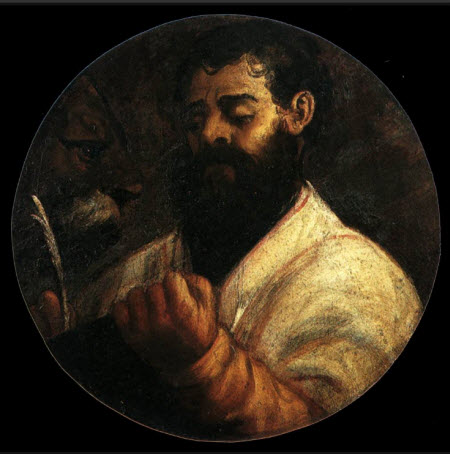Mark 7 Background Information with Maps and Images (Picture Study Bible - Mark) Free Bible Online
Mark 7
But you say, 'If a man tells his father or his mother, "Whatever profit you might have received from me is Corban, that is to say, given to God";'
Select a Chapter
Select a Book of the Bible
-
Genesis |
Exodus |
Leviticus |
Numbers |
Deuteronomy |
Joshua |
Judges |
Ruth |
1 Samuel |
2 Samuel |
1 Kings |
2 Kings |
1 Chronicles |
2 Chronicles |
Ezra |
Nehemiah |
Esther |
Job |
Psalms |
Proverbs |
Ecclesiastes |
Song of Solomon |
Isaiah |
Jeremiah |
Lamentations |
Ezekiel |
Daniel |
Hosea |
Joel |
Amos |
Obadiah |
Jonah |
Micah |
Nahum |
Habakkuk |
Zephaniah |
Haggai |
Zechariah |
Malachi |
Matthew |
Mark |
Luke |
John |
Acts |
Romans |
1 Corinthians |
2 Corinthians |
Galatians |
Ephesians |
Philippians |
Colossians |
1 Thessalonians |
2 Thessalonians |
1 Timothy |
2 Timothy |
Titus |
Philemon |
Hebrews |
James |
1 Peter |
2 Peter |
1 John |
2 John |
3 John |
Jude |
Revelation |
The Book of Mark
Mark 1:15 - And saying, The time is fulfilled, and the kingdom of God is at hand: repent ye, and believe the gospel.
Mark 2:12 - And immediately he arose, took up the bed, and went forth before them all; insomuch that they were all amazed, and glorified God, saying, We never saw it on this fashion.
Mark in The New Testament - A Brief Overview

Painting of St. Mark by Titian - 1560
Introduction to The Gospel of Mark
The Word Gospel. The second book of the English Bible that most of us read from is the Gospel of Mark. Mark is the second of the four gospel writings, yet there is only one gospel about Jesus Christ and there are four different writers: Matthew, Mark, Luke, and John. The word "Gospel" means "good news", and the good news is about Jesus Christ dying on the cross and then 3 days later conquering death and rising from the dead, offering salvation to all mankind, this is the Gospel.
Summary of The Book of Mark
Brief Summary. Jesus of Nazareth is the suffering servant who came to die for the sins of all men. He did His work and "immediately" went to the cross, so be encouraged all who are suffering because Christ suffered for you.
Purpose. The Book of Mark is the shortest of the 4 Gospel accounts of the life of Jesus Christ. and he seems to write his account of the Gospel of Christ with a sense of urgency. He mentions the word "immediately" 27 times. In Mark many times Jesus exercises actions rather than words, which would impress his Roman readers who the Book seems to be addressing. He portrays Jesus as a man of power and miracles, who could set aside the laws of nature at will. Yet this powerful Son of God was the suffering servant who would give up His life as a ransom for all mankind (Mark 10:45). The clear purpose of mark was to encourage those suffering persecution that their master suffered first, and He suffered for them.
Audience. Apparently Mark wrote his Gospel account to encourage gentile Christians in Rome who were facing the persecutions of the Emperor Nero. History is clear about the atrocious behavior of the Romans and especially the insanity of Nero. The other evidence that scholars bring up concerning mark's audience as being gentiles is the fact that Mark does not deal with Jewish Laws and he only quotes one prophecy from the Old Testament. There is also careful thought into explaining Jewish customs and idioms. (See Mark 3:7; 5:41; 7:2; 10:46; 14:36; 15:34; 9:43; 14:12; 15:42).
Authorship. The gospel of Mark does not proclaim who the author is within the document, yet the information that we know about Mark can be seen in the writer of this gospel. It is evident that the writer was Jewish, he was a Christian, and he was familiar with every day Jewish life, as well as the Jewish Scriptures. We know from the Scriptures that Mark was Jewish, and he knew the teachings of Jesus very well. He also knew the teachings of the rest of the apostles. It is also important to notice that after Peter was imprisoned he went to the house of Mary, the mother of Mark (Acts 12:12-17). Also Peter mentions in his epistle "my son Mark" (1 Peter 5:13). During Paul's missionary journeys Mark became a companion of Paul and Barnabas, and he left them at Perga in Pamphylia (Acts 13:13), after Paul had rebuked him. Many years later Mark regained the favor of Paul (Col. 4:10; 2 Tim. 4:11). Early Church tradition unanimously ascribes the second gospel to Mark as a companion of Peter and the writer of the second Gospel. One prologue to the Gospels which was written around 160 AD has this statement: "Mark� Was Peter's interpreter, and after Peter's decease wrote down this gospel in the region of Italy." Irenaeus, Clement of Alexandria and Tertullian also attest to Mark as the author.
Location. Nothing in the Gospel of Mark indicates where it was written from. Most of the early writers who boast of Mark as the author also name Rome as the place it was written.
Date. Early Christian writers and traditions place the Gospel of Mark sometime close to the end of Peter's life, around 60-65 AD. Most scholars agree that the Gospel of Mark was written before the destruction of Jerusalem in 70 AD, while the Second Temple in Jerusalem was still standing (Mark 13:1-2). Many scholars do not believe in the miracle of predictive prophecy and argue that the Gospel of Mark was written after the fall of Jerusalem, because of the accurate details of the events that Jesus spoke about. Mark's Gospel account seems to have been written as encouragement to the Christians who were facing the persecution of the Emperor Nero which took place in 64 AD.
Outline of the Book of Mark
The Servant Comes - Chapter 1:1-13
The Servant's Work - Chapters 1:14-13:37
The Servant's Death - Chapters 14:1-15:47
The Servant's Resurrection - Chapter 16:1-20

The Name Jesus In Ancient Hebrew Text
"Yeshua" in First Century Hebrew Text. This is how the name "Jesus"
would have been written in ancient Hebrew documents. The four letters or
consonants from right to left are Yod, Shin, Vav, Ayin (Y, SH, OO, A).
Jesus is the Greek name for the Hebrew name Joshua or Y'shua which means
"The LORD or Yahweh is Salvation".
Mark Resources
Outline of the Life of Jesus in Harmony
Simple Map of First Century Israel
Topographical Map of First Century Israel
Map of the Ministry of
Jesus
Map of the Roads in Ancient Israel
Map of the Roman Empire
Bibliography Information
Free Bible Online - Picture Study Bible, King James Version. New York: American Bible Society: www.free-bible.com, 1995-2013. Bible History Picture Study Bible. Nov 05, 2024.
- King James Bible Home
- Free Bible Home Page
- Bible Encyclopedia (ISBE)
- Online Bible (KJV)
- Naves Topical Bible
- Smith's Bible Dictionary
- Easton's Bible Dictionary
- Fausset's Bible Dictionary
- Matthew Henry Bible Commentary
- Hitchcock's Bible Dictionary
Read The Bible
- 1599 Geneva Bible (GNV)
- 21st Century King James Version (KJ21)
- American Standard Version (ASV)
- Amplified Bible (AMP)
- Amplified Bible, Classic Edition (AMPC)
- Authorized (King James) Version (AKJV)
- BRG Bible (BRG)
- Christian Standard Bible (CSB)
- Common English Bible (CEB)
- Complete Jewish Bible (CJB)
- Contemporary English Version (CEV)
- Darby Translation (DARBY)
- Disciples’ Literal New Testament (DLNT)
- Douay-Rheims 1899 American Edition (DRA)
- Easy-to-Read Version (ERV)
- English Standard Version (ESV)
- English Standard Version Anglicised (ESVUK)
- Evangelical Heritage Version (EHV)
- Expanded Bible (EXB)
- GOD’S WORD Translation (GW)
- Good News Translation (GNT)
- Holman Christian Standard Bible (HCSB)
- International Children’s Bible (ICB)
- International Standard Version (ISV)
- J.B. Phillips New Testament (PHILLIPS)
- Jubilee Bible 2000 (JUB)
- King James Version (KJV)
- Lexham English Bible (LEB)
- Living Bible (TLB)
- Modern English Version (MEV)
- Mounce Reverse Interlinear New Testament (MOUNCE)
- Names of God Bible (NOG)
- New American Bible (Revised Edition) (NABRE)
- New American Standard Bible (NASB)
- New American Standard Bible 1995 (NASB1995)
- New Catholic Bible (NCB)
- New Century Version (NCV)
- New English Translation (NET)
- New International Reader's Version (NIRV)
- New International Version - UK (NIVUK)
- New International Version (NIV)
- New King James Version (NKJV)
- New Life Version (NLV)
- New Living Translation (NLT)
- New Matthew Bible (NMB)
- New Revised Standard Version (NRSV)
- New Revised Standard Version Catholic Edition (NRSVCE)
- New Revised Standard Version, Anglicised (NRSVA)
- New Revised Standard Version, Anglicised Catholic Edition (NRSVACE)
- New Testament for Everyone (NTE)
- Orthodox Jewish Bible (OJB)
- Revised Geneva Translation (RGT)
- Revised Standard Version (RSV)
- Revised Standard Version Catholic Edition (RSVCE)
- The Message (MSG)
- The Voice (VOICE)
- Tree of Life Version (TLV)
- World English Bible (WEB)
- Worldwide English (New Testament) (WE)
- Wycliffe Bible (WYC)
- Young's Literal Translation (YLT)
Table of Contents
Main Menu
- Ancient Assyrian Social Structure
- Ancient Babylonia
- Ancient Canaan During the Time of Joshua
- Ancient History Timeline
- Ancient Oil Lamps
- Antonia Fortress
- Archaeology of Ancient Assyria
- Assyria and Bible Prophecy
- Augustus Caesar
- Background Bible Study
- Bible
- Biblical Geography
- Fallen Empires - Archaeological Discoveries and the Bible
- First Century Jerusalem
- Glossary of Latin Words
- Herod Agrippa I
- Herod Antipas
- Herod the Great
- Herod's Temple
- High Priest's in New Testament Times
- Jewish Literature in New Testament Times
- Library collection
- Map of David's Kingdom
- Map of the Divided Kingdom - Israel and Judah
- Map of the Ministry of Jesus
- Matthew Henry Bible Commentary
- Messianic Prophecy
- Nero Caesar Emperor
- Online Bible Maps
- Paul's First Missionary Journey
- Paul's Second Missionary Journey
- Paul's Third Missionary Journey
- Pontius Pilate
- Questions About the Ancient World
- Tabernacle of Ancient Israel
- Tax Collectors in New Testament Times
- The Babylonian Captivity
- The Black Obelisk of Shalmaneser
- The Books of the New Testament
- The Court of the Gentiles
- The Court of the Women in the Temple
- The Destruction of Israel
- The Fall of Judah with Map
- The History Of Rome
- The Incredible Bible
- The Jewish Calendar in Ancient Hebrew History
- The Life of Jesus in Chronological Order
- The Life of Jesus in Harmony
- The Names of God
- The New Testament
- The Old Testament
- The Passion of the Christ
- The Pharisees
- The Sacred Year of Israel in New Testament Times
- The Samaritans
- The Scribes
Ancient Questions
- How did the ancient Greeks and Romans practice medicine and treat illnesses?
- What were the major contributions of ancient Babylon to mathematics and astronomy?
- How did the ancient Persians create and administer their vast empire?
- What were the cultural and artistic achievements of ancient India, particularly during the Gupta Empire?
- How did ancient civilizations like the Incas and Aztecs build their remarkable cities and structures?
- What were the major trade routes and trading practices of the ancient world?
- What was the role of slavery in ancient societies like Rome and Greece?
- How did the ancient Mayans develop their sophisticated calendar system?
- What were the key events and significance of the Battle of Thermopylae in ancient Greece?
- What was life like for women in ancient Rome?
Bible Study Questions
- The Authorized (King James) Version (AKJV): Historical Significance, Translation Methodology, and Lasting Impact
- Exploring the English Standard Version (ESV): Its Aspects, Comparisons, Impact on Biblical Studies, and Church Use
- A Detailed Historical Analysis of Language Updates in the KJ21: Comparison with Other Versions
- A Detailed Historical Analysis of the American Standard Version (ASV): Comparison to the King James Version, Influence on Later Translations, and Evaluation of Strengths and Weaknesses
- A Detailed Historical Analysis of Amplifications in the Amplified Bible (AMP) and Its Comparison to Other Bible Translations
- Detailed Historical Analysis of the Amplified Bible Classic Edition (AMPC): Examples of Amplifications and Comparative Analysis with Other Bible Translations
- Theological Implications of the BRG Bible's Color-Coding System: A Comparative Analysis
- The Christian Standard Bible (CSB): An In-Depth Analysis
- The Geneva Bible: Theological Distinctives, Impact on English Literature, and Role in Bible Translation History
- Exploring the Common English Bible (CEB): Translation Methodology, Church Use, and Comparative Analysis
About
Welcome to Free Bible: Unearthing the Past, Illuminating the Present! Step into a world where ancient history and biblical narratives intertwine, inviting you to explore the rich tapestry of human civilization.
Discover the captivating stories of forgotten empires, delve into the customs and cultures of our ancestors, and witness the remarkable findings unearthed by dedicated archaeologists.
Immerse yourself in a treasure trove of knowledge, where the past comes alive and illuminates our understanding of the present.
Join us on this extraordinary journey through time, where curiosity is rewarded and ancient mysteries await your exploration.
Recent posts
-

Creating a Cozy Living Room
Creating a Cozy Living Room: Interior Design Tips for Comfort and Style The living room serves as the heart of the home—a space where relaxation, en... -

Halloween Mystery Boxes – Professional Tattoo Machines & Accessories by Vlad Blad Irons
This Halloween, Vlad Blad Irons is adding excitement and surprises for tattoo artists with their exclusive Halloween Mystery Boxes! Available only unt... -

Sports, Cybersport, and Betting: A Blend of Ancient Traditions and Modern Thrills
Sports had been a great a part of human records, supplying amusement, competition, or even non secular importance across cultures. Today, the rise of ... -

How to Remove Watermarks from Photos Using DeWatermark.AI
In ultra-modern digital age, pictures play a critical role in private and professional projects. Whether it is for social media, content material crea... -

Ethical Employee Monitoring: Alternatives to Screen Capture for Better Productivity
Screen monitoring has become a crucial component of today’s work environments, especially with remote and hybrid models on the rise. Many companies ...
